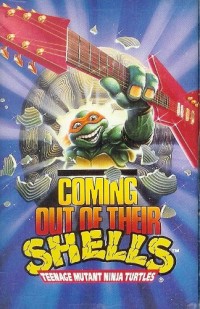With the dawn of 1990, the Teenage Mutant Ninja Turtles seemed poised to take over the collective pop culture consciousness. Although they had begun their career in the late '70s by fighting crime and brutally killing criminals with medieval weaponry (as told in the biographical work of Eastman and Laird), by the mid-'80s, they realized that a kinder, more gentler approach was necessary to captivate the hearts of many. Where they had formerly disemboweled purse-snatchers with razor-sharp sais, now they wrapped criminals in ropes in order to incapacitate. Where they once brutally impaled would-be rapists with katanas, now they sliced off the head of a fire hydrant and knocked the attackers out, allowing them to be handily arrested by the police.
Such an approach worked, and paved the way for the Turtles to star in their own movies and cartoons which allowed them to create a merchandising empire. By the time 1990 had rolled around, their nemesis Shredder had been defeated by being mashed in a garbage truck, as seen in the first TMNT movie, and the Turtles had become a global phenomenon. With most forms of media locked up, the Turtles turned to music to expand both their brand and message.
Embarking on the Coming out of Their Shells Tour, the Turtles toured as a live rock and roll act and played dates across the USA. To help promote the tour, they released the Coming Out of Their Shells album in conjunction with Pizza Hut. Available with the purchase of any large one-topping pizza and collectors' cup (singular), the album was the first–and last–time the TMNT would allow an unfettered look into their personal sides.
Unfortunately, what could have been an intimate portrait that revealed the innermost thoughts of permanent outcasts turned out to be another overproduced, long-winded '80s pop album. The album covers being a teenager, pizza, ninjas, and multiple permutations of those elements. Leonardo, the oldest brother, opens the album with the self-titled song. While the hook "coming out of their shells" has a great deal of metaphorical promise, unfortunately, the leader of the TMNT basically confines himself to the refrain, shielding his thoughts with what is, at best, a semi-catchy refrain.
This continues throughout the album on tracks like "Walk Straight", a tune designed to keep youngsters out of a life of crime. Where Johnny Cash would have told the story of a good man who resulted to crime in a series of bad choices, and allowed the listener to realize the message without any direct reference, the Turtles simply demand that the listener not turn to evil ways. Where Ice Cube would have argued that most crime is the result of exterior forces, the Turtles offer no compassion for those that are forced to break the law.
To be fair, there are some fun beats–if not substance–on the release. On "Cowabunga", Michelangelo, the fun-loving brother raps about how music saved him from a life of crime through rhyme styles developed by the Sugarhill Gang and similar artists. "Pizza Power" opens with remarkable bombast and quickly warps into a Prince-style club jam.
But, no matter how strong the material might have been, the thick '80s production, which would have been passé even when the album was released, kill any sense of feeling or urgency the album might have had. The guitars are too filtered. The drums are obviously programmed. And worst of all, the vocals are so polished that it is difficult to tell one brother apart from another, despite their obviously different accents as seen in both their cartoons and movies.
Interestingly, there is a parallel between the TMNT and another New York group: Bad Brains. Both groups emigrated to the mean streets of NYC–Bad Brains from D.C., and the Turtles from the sewer. Both refrain from eating meat–Bad Brains were devout vegetarians and the Turtles feasted exclusively on pizza. Like Bad Brains, the TMNT preached positivity and doing the right thing. H.R. frequently praised his bearded messiah, Haile Selassie, while the Turtles listened to the lessons of their mentor, the bearded Splinter the Ninja Rat. Unfortunately, while Bad Brains' excursions into heavy metal, funk, and even hip-hop were often more successful than not, the Turtles' foray into those genres bred nothing but mediocrity.
The Turtles are perpetually outsiders, never accepted by their surroundings, nor able to fit in anywhere else, despite that they dedicate most of their days to helping those who would shun them. What could have been a look into the psyche of the noble outsider, along the lines of Damaged or Zen Arcade, winds up being little more than '80s fluff production. This album isn't so much from the half-shell as it is half-baked.
